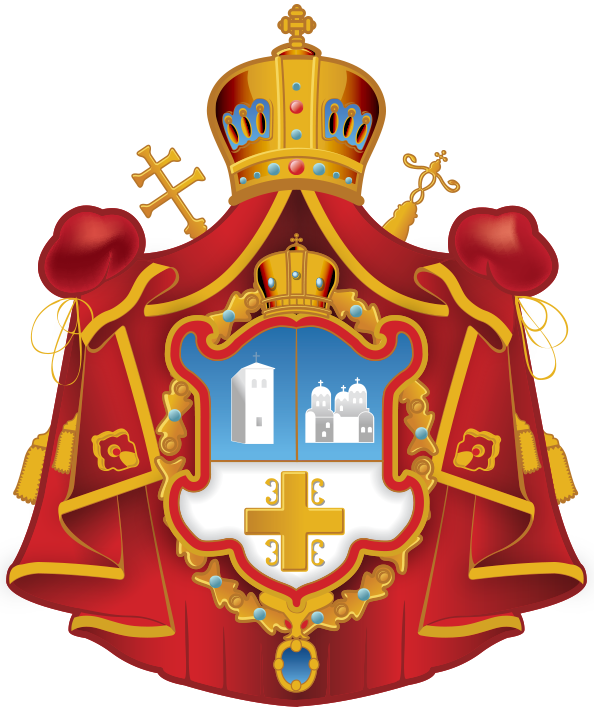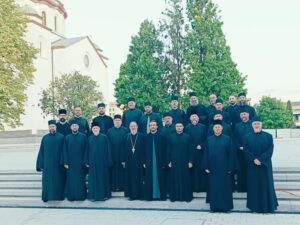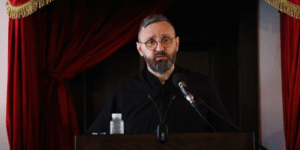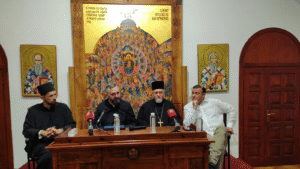We continue with the next verses of the second chapter of the Gospel according to Matthew. Verses 3 and 4 read:
“When King Herod heard this, he was troubled, and all Jerusalem with him. And assembling all the chief priests and scribes of the people, he inquired of them where the Christ was to be born.”
The question of the Magi caused great unrest in Jerusalem, particularly for Herod but also among the Judean aristocracy. Each had their own reasons for fear. Herod was acutely aware that his position on the Jewish throne was unlawful. His summoning of the chief priests and scribes and his inquiry concerning the birthplace of the Christ demonstrates that he was familiar with the prophecy concerning the Messiah’s birth. The Magi had said they were seeking the King of the Jews, and Herod in turn asked the chief priests where the Christ was to be born. This indicates that he clearly understood the identity of the Messiah as the true King of Israel. He feared—if we may use modern language—for his position. He was prepared to commit any crime to preserve his power, as subsequent events will reveal.
Herod’s fear is, in a sense, understandable. However, the Holy Fathers speak extensively about the fear that gripped not only Herod but also the people of Jerusalem. St. Nikolai of Žiča insightfully explains the inner state of their souls—the absence of any true desire to be with God. And nothing about this condition differs from that found in similar hearts today. He writes:
“Why were they troubled—those who spoke of Him daily, who offered prayers every day for His coming? Why did they fear the arrival of the One whom their ancestors had awaited for thousands of years? The sin within disturbed them; their criminal souls were afraid… ‘Why do we need Him?’ they may have thought. ‘We are doing just fine without Him. Let Him appear to some later generation, not ours. There’s still time. He’ll disturb us, burden us with new duties, expose our crimes, uncover our schemes, reveal our worthlessness, push us from our positions, and raise up new men—His men. He’ll leave us hungry, completely hungry, without bread and without power; He’ll take the people into His own hands and cast us aside—perhaps even imprison, judge, and execute us.’ All of this is exactly what today’s wrongdoers would feel and think if someone were to say: ‘Behold, Christ is coming!’”
St. Nikolai of Ohrid and Žiča captures with great depth the psychology of the human being who simply does not want to be with God.
We continue with verses 5 and 6:
“They told him, ‘In Bethlehem of Judea; for so it is written by the prophet:
And you, O Bethlehem, in the land of Judah,
are by no means least among the rulers of Judah;
for from you shall come a ruler
who will shepherd my people Israel.’”
St. Innocent of Kherson notes here that, regardless of the moral state of the chief priests at that time and their indifference towards God, they nonetheless fulfilled their role—they pointed to what was written in the Law and the Prophets. This gives context to the Lord’s words in Matthew 23:2–3:
“The scribes and the Pharisees sit on Moses’ seat. So practice and observe whatever they tell you—but not what they do. For they preach, but do not practice.”
This may serve as a necessary reminder to certain contemporary Orthodox Christians who, in their misplaced zeal, allow themselves to insult the episcopate or accuse it of betraying Orthodoxy—often based on hearsay or speculation, such as: “I read it online,” or “a devout brother told me.”
The prophecy referenced by the Evangelist Matthew was originally spoken by the prophet Micah, who lived approximately 700 years before Christ and was a contemporary of the prophet Isaiah. Blessed Theophylact of Ohrid explains that the prophet emphasized that a Leader would come from Bethlehem—it was not stated that He would remain there. This aligns with Christ’s life, who, after His birth, lived in Nazareth and later in Capernaum, as Matthew 4:13 testifies:
“And leaving Nazareth He went and lived in Capernaum by the sea.”
St. Nikolai of Žiča further comments on the phrase “He will shepherd my people Israel,” emphasizing that the word “shepherd” is not used by accident. It accurately expresses Christ’s care and love for His people. He writes:
“This means that He will not be like other kings and rulers who only know how to dominate over people, but rather He will be a nourisher of the people, as a parent is to their children.”
Thus, Christ cares for us just as the Good Shepherd cares for His sheep.
The Incomplete Citation of the Prophecy and Herod’s Hidden Intentions
It should be noted that the chief priests themselves did not cite the prophecy of the prophet Micah in its entirety, but only partially. The full text reads:
“But you, Bethlehem Ephrathah, though you are little among the thousands of Judah, yet out of you shall come forth to Me the One to be Ruler in Israel, whose goings forth are from of old, from everlasting.” (Micah 5:2)
As we can see, the priests and scribes omitted the final part, which unmistakably refers to the divine nature of the One to be born—for to whom among men can it be said that his “goings forth are from of old, from everlasting”? St. Cyril of Alexandria remarks that their quotation of the prophecy was ultimately in vain, because they failed to recite the prophet’s words to the end.
The prophet Micah adds the name Ephrathah to Bethlehem, as this was the name used in the time of the patriarchs. It means “fruitful field,” essentially the same in meaning as Bethlehem, “house of bread.”
St. Cyril also teaches that the phrase “My people Israel” refers not only to the Jews but also to all Christians from among the Gentiles. He explains:
“The meaning of the name ‘Israel’ is ‘the mind that sees God.’ Therefore, the Church from among the Gentiles was also called Israel—not according to the flesh, but by divine grace.”
As the Apostle Paul states in Romans 9:6:
“For they are not all Israel who are of Israel.”
We now proceed to verse 7 of Matthew chapter 2:
“Then Herod secretly called the wise men and ascertained from them what time the star appeared.”
St. John Chrysostom sees in Herod’s action the behavior of a man consumed by malice—a soul that has become irrational. He writes:
“What folly! Herod, if your intentions were sincere, why do you ask in secret? If your intentions were evil, do you not realize that your secrecy will cause the Magi to suspect you? A soul possessed by malice becomes entirely senseless.”
St. John further explains that Herod called the Magi privately because he feared that the Jews might seek to protect their Messiah. The extraordinary nature of the news he heard, the fact that these were foreigners from distant lands, did nothing to dissuade him from his intent to eliminate what he perceived to be a rival to his throne.
St. Innocent of Kherson observes that Herod, in calling the Magi secretly, sought to extract as many details as possible. During the conversation, he likely inquired about their homeland, background, profession, and so forth, but the Evangelist highlights what truly concerned Herod—the timing of the star’s appearance. St. Innocent adds that the Magi might have wondered why Divine Providence had not revealed the birth of Christ to the Jews themselves, since they possessed so many prophecies. This allowed Herod to appear well-intentioned, even devout—concerned with the coming of the Messiah. After all, not only did he inquire himself, but he had also assembled an entire council of chief priests in search of precise information.
Regarding the timing of the star’s appearance, St. John Chrysostom explains that it had appeared well before Christ’s actual birth, since the Magi would have needed significant time to undertake their long and perilous journey. This is entirely reasonable—for if the star had appeared only at the moment of the Nativity, by the time the Magi arrived in Jerusalem, the Christ Child would already have departed from Bethlehem.
We continue with verses 8 and 9:
“And he sent them to Bethlehem, saying, ‘Go and search diligently for the child, and when you have found him, bring me word, that I too may come and worship him.’ After listening to the king, they went on their way. And behold, the star that they had seen in the East went before them until it came to rest over the place where the child was.”
St. Nikolai of Ohrid brilliantly reveals the wicked intent behind Herod’s words:
“He seeks to turn the stargazers into his spies, and later into accomplices in the crime he had already conceived in his heart. These noble guests, moved by their thirst for truth and freedom, who had left behind their homes and all worldly comforts to embark upon a distant and dangerous journey, are now to be drawn into the schemes of the bloodthirsty ruler of the chosen people—Herod—as he prepares a dreadful crime.”
St. Ambrose of Milan notes an important detail: even though Herod wished harm upon Christ, he nevertheless sent the Magi under the pretext of worship. In this way, he inadvertently acknowledged Christ as God. Thus, in the teaching of the Fathers, even the evil intentions of men and demons are ultimately used by God to bring about good.
Adapted and presented for the contemporary reader, based on patristic interpretations, by Stanoje Stanković.





